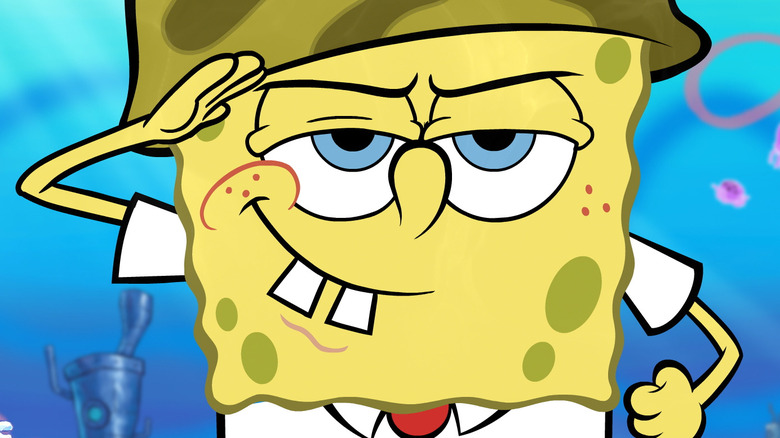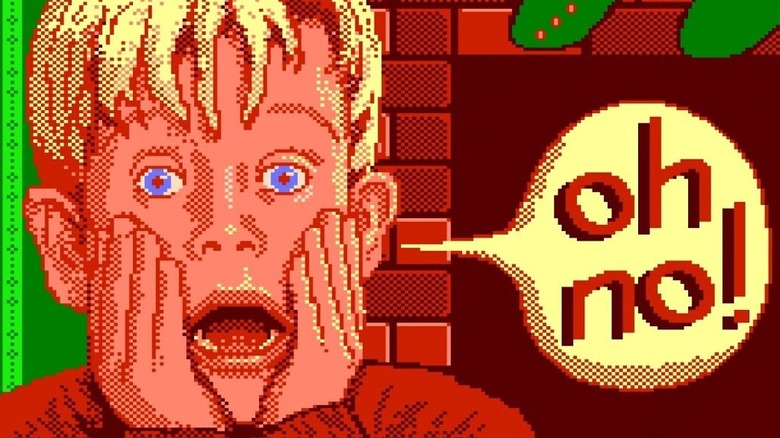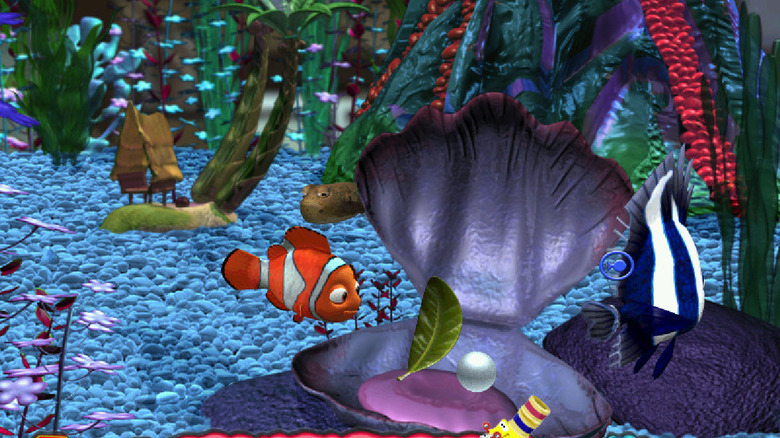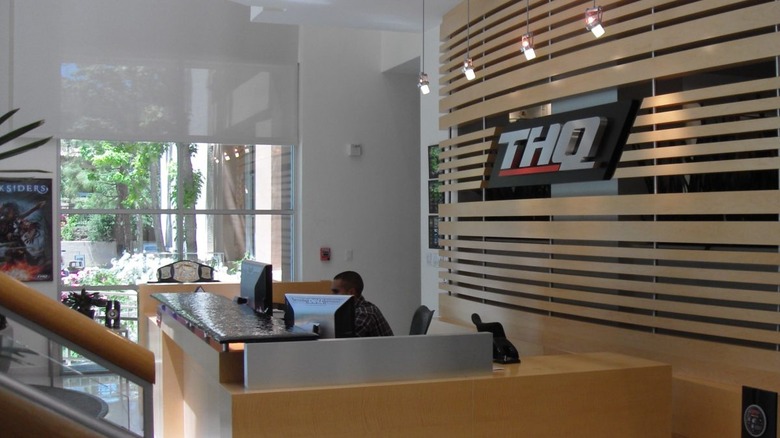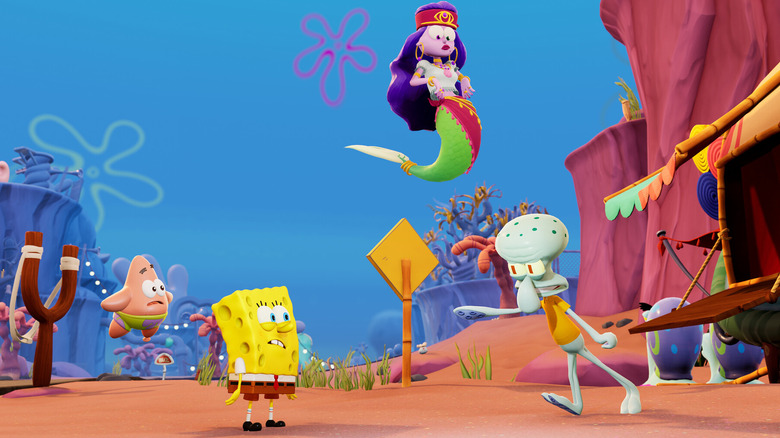Whatever Happened To THQ?
The gaming industry has changed significantly over time, and many development studios that used to be recognized worldwide are now all but gone. Companies that were there from the very start aren't guaranteed a spot at the winner's table more than half a century later, and more recent companies like Neversoft — which is responsible for the best and worst of "Tony Hawk Pro Skater" – aren't guaranteed to succeed in the long-term either. THQ was but another gaming company that was influential during its reign but, in the end, didn't stay on top for long.
Most know THQ from its movie and show tie-in games, which formed the company's primary business strategy from the very start. But despite having its very own lucrative corner of the crossover games market, THQ just couldn't unload its financial burdens. Eventually, THQ declared bankruptcy, but that doesn't mean the company is gone — not wholly, at least. Instead, a newer game company took the reins and brand name and ran with it and has since been releasing remasters of classic THQ games like "Battle For Bikini Bottom."
To understand how everything went wrong for this game publisher, it's necessary to start from the beginning. In 1990, when THQ was founded, it was a hybrid games and toy company, but putting out a product wasn't the first thing on Jack Friedman's mind: At first, it was all about acquiring new studios and building a foundation.
THQ's early strategy was to acquire the rights to make tie-in games
THQ — an initialism for the company's full name Toy Headquarters — was founded in April 1990 by Jack Friedman, a veteran of the toys industry and an entrepreneur in his own right. Friedman had just come from LJN, another game and toy publisher he founded that was then sold to Acclaim Entertainment, and was looking to establish a game development powerhouse. Like LJN, THQ was also split between video games and toys, but it didn't take long for the company to re-orient itself fully around video game production.
The main strategy for this was movie and brand tie-in games, and in the early days, THQ was able to pick up plenty of adaptations to take on. Crossover games for "Home Alone" and "The Flash" were among THQ's first projects in its first two years, and the decades to come afterward saw the publisher take on some of the world's biggest brands — including an exclusive Nickelodeon deal in the 2000s (per Gamespot). THQ was prolific, to say the least, and to get all of these projects completed, THQ slowly but surely acquired its own game developers, like Black Pearl Software and "Warhammer 40k: Dawn of War" studio Relic Entertainment.
THQ reached its financial summit in 2007, bringing in over a billion dollars. After that, it was all downhill, and there were a few reasons attributed to why things got bad so quickly.
It became a billion-dollar company in 2007, but the good times wouldn't last long
By 2007, THQ had the video game rights to some of the world's most recognizable IPs in the world. A few years earlier, the games company signed a long-term contract with Nickelodeon to create a line of games based on the network's then-airing shows. In 2007 THQ reportedly had a record $68 million profit from a total of a billion-plus in revenue that year. Still, those heights quickly turned to valleys for the company as 2008 and 2009 saw a rapid decline in its financial stability. Part of the burden came from the oncoming recession from 2007 to 2009, but not all of it. THQ's mistakes may have proved to be its undoing in the end.
According to a Kotaku article, THQ shut down five of its internal development studios in 2008 after failing to meet sales expectations. Some fans and industry insiders attribute much of it to the utter failure of the uDraw tablet, which lost THQ tens of millions in revenue after it failed to take off and captivate audiences as the company had hoped.
Additionally, some observers point out that the concept of a movie tie-in game doesn't exist the same way it used to when THQ was in its golden days. Without the same access to the cash cow of adaptation IP rights and the slew of other issues it faced, THQ suffered a slow death and eventually declared bankruptcy five years later.
THQ closed its doors in 2013, but it didn't vanish
In the years following, THQ rapidly declined. The losses that the uDraw's failure incurred on THQ were catastrophic, and it's remembered as one of the worst ideas in video game history. THQ invested a fortune into promoting and putting this device out there as a peripheral for multiple consoles. Still, it wasn't popular, and the company ended up sitting on more than 1.4 million of them. The uDraw wasn't even a particularly innovative or well-built piece of tech. According to one Reddit user who posted about the tablet closer to its release, it "was nearly impossible to make anything look good" with the uDraw.
In 2009, practically during the recession, revenue at THQ had reduced massively to only around $173 million. So to make up for the losses, THQ began selling off its studios and properties, starting with Big Huge Games, the studio behind a number of strategy games like "Kingdoms of Amalur." As the years went by, more studios were sold off, it relinquished the rights for its most prized brand deals to its competitors, and its IPs were auctioned, too.
In late 2012, THQ declared bankruptcy and departed the video gaming industry for good. At least, the original THQ did — after purchasing the rights to the name and its remaining assets in 2013, THQ Nordic has continued what the original THQ left unfinished. The uDraw might have flopped so hard that it destroyed the studio, but THQ Nordic seems determined to bring things back around.
After its acquisition in 2014, iconic THQ properties live on at THQ Nordic
THQ, as fans knew it, is gone and has been for the better part of a decade now, but THQ Nordic yet lives. Initially, the company was called Nordic Games, and players might recognize that name from the critically divisive "Biomutant." However, it didn't change its name to THQ Nordic until 2016 — Nordic Games didn't just want to be able to continue the legacy of THQ; it wanted to benefit from the relatively good standing it had, too. In an interview with Polygon, THQ Nordic Co-Founder Lars Wingefors praised THQ's reach and catalog in particular. "They did tons of great games," said Wingefors. "I think that the bankruptcy was the end of that, but I would rather focus on the good years."
THQ Nordic didn't waste any time in bringing the now-dead publisher's dormant properties back to life, with "Darksiders 3" announced in 2017 – just one year after the name change. More recently, the remastered edition of "Destroy All Humans" and its sequel brought back two of the most iconic games of the PS2 and Xbox era. There's a future for fans of THQ games as THQ Nordic faithfully recreates a number of the company's most iconic projects and revives dormant franchises. THQ, as players once knew it is long dead and buried, but THQ Nordic aims to carry the torch in more than just name.

